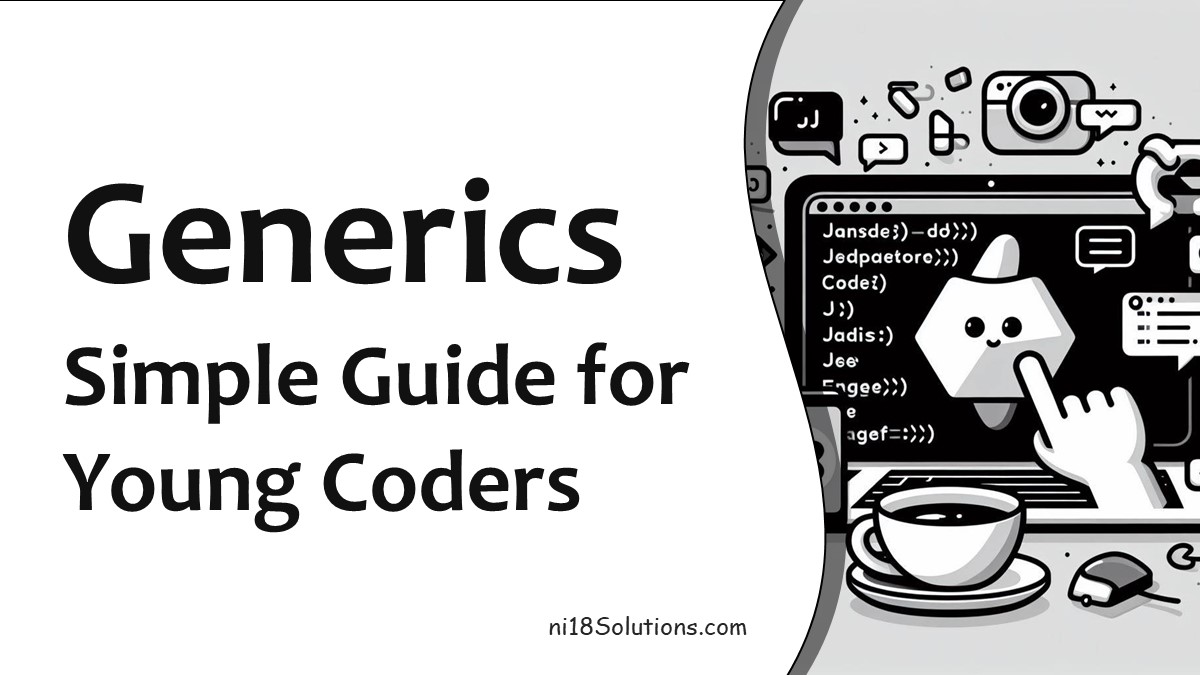Imagine you’re a chef in a restaurant. You have a recipe that works well with any ingredient—be it potatoes, carrots, or chicken. Wouldn’t it be great if you could use the same recipe, regardless of the ingredient? In the world of programming, this is where generics come into play.
Generics, in simple terms, are like the recipe. They allow you to write a method, a class, or an interface that can work with any data type, just like how your recipe can work with any ingredient. The best part? They ensure safety at compile time, meaning fewer errors when you run your code.
Table of Contents
What are Generics?
In programming, we often write code that is supposed to work on different types of data. For example, we might have a method that adds two numbers. But what if we want to use this method for integers, floats, or even strings? We could write separate methods for each data type, but that would lead to a lot of repetitive code.
This is where generics come in. Generics allow us to write code that is independent of the data type. This means we can write one method, class, or interface that can be used with any data type.
public class Box<T> {
private T t;
public void set(T t) {
this.t = t;
}
public T get() {
return t;
}
}In the above example, T is a type parameter that represents any data type. When we create a new Box object, we can specify the data type we want to use with it.
Why Use Generics?
Generics have two main advantages:
- Type Safety: Generics provide stronger type checks at compile time. A Java compiler applies strong type checking to generic code and issues errors if the code violates type safety. Fixing compile-time errors is easier than fixing runtime errors, which can be difficult to find.
- Code Reusability: Generics enable developers to implement generic algorithms that work on collections of different data types, can be customized, and are type-safe and easier to read.
Generics in Practice
Let’s see how we can use generics in practice. Suppose we have a class Pair that can hold a pair of objects. Without generics, we might define it like this:
public class Pair {
private Object first;
private Object second;
public Pair(Object first, Object second) {
this.first = first;
this.second = second;
}
// getters and setters
}
With this definition, we can create a pair of any two objects. But there’s a problem. There’s no way to ensure that the two objects are of the same type. This is where generics can help:
public class Pair<T> {
private T first;
private T second;
public Pair(T first, T second) {
this.first = first;
this.second = second;
}
// getters and setters
}
Now, when we create a Pair, we have to specify the type of objects it can hold, and both objects will be of the same type.
Generics and Type Parameters
In the context of generics, a type parameter is a placeholder for a data type. You can think of it as a variable for a data type. When we define a generic class or method, we declare these type parameters in a list of comma-separated type parameters, which are enclosed by angle brackets <>.
public class Box<T> {
// ...
}
In this example, T is a type parameter. When we create a new instance of Box, we can replace T with any data type we want.
Box<Integer> integerBox = new Box<>();
Box<String> stringBox = new Box<>();
Bounded Type Parameters
There might be times when you want to restrict the types that can be used as type parameters in a parameterized type. For example, you might want to ensure that the type parameter for a numeric operation is a number. You can achieve this with bounded type parameters.
public class NumericBox<T extends Number> {
// ...
}
In this example, T is a type parameter that must be a subclass of Number.
Wildcards
Wildcards are used to represent an unknown type. The question mark ?, represents the wildcard. The wildcard can be used as a type of a parameter, field, or local variable and sometimes as a return type.
We can define upper bounded wildcards, with the extends keyword, or lower bounded wildcards, with the super keyword.
public void process(List<? extends Foo> list) {
// ...
}
In this example, the process method can work with lists of Foo and any subtype of Foo.
Generic Methods
Just like type parameters can be declared for a class, they can also be declared for methods.
public static <T> void printArray(T[] array) {
for (T element : array) {
System.out.println(element);
}
}
In this example, T is a type parameter for the printArray method. This method can accept arrays of any type.
Generics add stability to your code by making more of your bugs detectable at compile time. As you continue your coding journey, you’ll find that generics are an integral part of Java, as well as many other statically-typed languages like C# and C++.
Conclusion
Generics are a powerful feature that enable you to write flexible and reusable code. They can seem a bit complex at first, especially if you’re new to programming. But with practice, you’ll find they can make your code more efficient and easier to read. So next time you find yourself writing the same code for different data types, consider whether generics could help! Happy coding!
